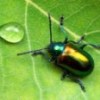Our first paper from the Beetle Tree of Life study has been published. Here's the citation:
Wild, A. L. & Maddison, D. R. 2008. Evaluating nuclear protein-coding genes for phylogenetic utility in beetles. Molecular Phylogenetics and Evolution, doi: 10.1016/j.ympev.2008.05.023
My co-author David Maddison once summarized the point of the paper as "Hey guys! New genes!"
What we've done is develop lab protocols for sequencing 8 nuclear genes that should be particularly useful for inferring the evolutionary history of beetles. It's a foundational paper. We created the methods that will be used for later studies where we actually get to the meat of our project, the beetle family tree.
This graph explains why we went to all the trouble.

Most genetic studies of beetle evolution use only a single locus. Typically one of the mitochondrial genes. Single-marker studies not only tend to have less data than multi-locus studies, but they are especially prone to go wrong when that marker has a different history than the lineage that contains it. (Hybridization, perhaps, or a population genetic phenomenon called "Lineage Sorting" that I won't explain here). What's more, coleopterists- and many entomologists generally- have fallen well behind other biologists in their methods. For instance, vertebrate biologists routinely publish phylogenies based on a dozen or more markers, while many entomologists labor away on the same single markers that were widely in use over 10 years ago.  At the start of the beetle project we simply did not have lab protocols to gather enough data, or even the right kind of data, to be able to answer our questions.
So here's to all the Coleopterists out there: Hey Guys! New Genes! Please Use!
Abstract:
Although nuclear protein-coding genes have proven broadly useful for phylogenetic inference, relatively few such genes are regularly employed in studies of Coleoptera, the most diverse insect order. We increase the number of loci available for beetle systematics by developing protocols for three genes previously unused in beetles (alpha-spectrin, RNA polymerase II and topoisomerase I) and by refining protocols for five genes already in use (arginine kinase, CAD, enolase, PEPCK and wingless). We evaluate the phylogenetic performance of each gene in a Bayesian framework against a presumably known test phylogeny. The test phylogeny covers 31 beetle specimens and two outgroup taxa of varying age, including three of the four extant beetle suborders and a denser sampling in Adephaga and in the carabid genus Bembidion. All eight genes perform well for Cenozoic divergences and accurately separate closely related species within Bembidion, but individual genes differ markedly in accuracy over the older Mesozoic and Permian divergences. The concatenated data reconstruct the test phylogeny with high support in both Bayesian and parsimony analyses, indicating that combining data from multiple nuclear loci will be a fruitful approach for assembling the beetle tree of life.

YES! Awesome! I'm so glad this is out, maybe people will start warming up to ArgK and PolII and what have you. I'm so grateful to you guys for sharing your primers & protocols-- can't wait to try out alphaspectrin and topoisomerase.
CAD, however, is still a bitch.
That's too bad- CAD is the magic gene that solves all problems. ;)